Session 6 - Ministries of the Church: Ordinances/Sacraments?
Related Media
Session Overview
Session Reading (for self-study students)
Related Topics: Ecclesiology (The Church)
Session 7 - Gifts of the Church: How are We Equipped to Accomplish Our Ministries?
Related Media
Session Overview
Session Reading (for self-study students)
Related Topics: Ecclesiology (The Church)
Session 8 - Marks of a False Church and the Government of the Church
Related Media
Session Overview
Session Reading (for self-study students)
Related Topics: Ecclesiology (The Church)
Session 9 - What are the Different Views of the Millennium?
Related Media
Session Overview
Session Reading (for self-study students)
Related Topics: Eschatology (Things to Come), Prophecy/Revelation
Session 10 - The Rapture and the Afterlife
Related Media
Session Overview
Session Reading (for self-study students)
Related Topics: Eschatology (Things to Come), Prophecy/Revelation, Hell, Heaven
APRIL 2013 NEWSLETTER
|
||||||||||||||||||||||||||||||||||||||||||||||||
Bible.org | 1101 E Arapaho Rd Ste 260 | Richardson | TX | 75081
|
Related Topics: Administrative and Organization
What does the Greek word "tetelestai" mean?
Literally translated the word tetelestai means, “It is finished.” The word occurs in John 19:28 and 19:30 and these are the only two places in the New Testament where it occurs. In 19:28 it is translated, “After this, when Jesus knew that all things were now completed, in order that the scripture might be fulfilled, he said, ‘I thirst.’” Two verses later, he utters the word himself: “Then when he received the sour wine Jesus said, ‘It is finished,’ and he bowed his head and gave up his spirit.”
The word tetelestai was also written on business documents or receipts in New Testament times to show indicating that a bill had been paid in full. The Greek-English lexicon by Moulton and Milligan says this:
“Receipts are often introduced by the phrase [sic] tetelestai, usually written in an abbreviated manner...” (p. 630). The connection between receipts and what Christ accomplished would have been quite clear to John’s Greek-speaking readership; it would be unmistakable that Jesus Christ had died to pay for their sins.
Related Topics: Bibliology (The Written Word), Bible Study Methods, Terms & Definitions
Homosexuality Is Unnatural: The Is-Ought Fallacy?
Article contributed by Stand To Reason
Visit Stand To Reason website
Recently a caller to the radio told me about a conversation he’d had about homosexuality. The caller made the teleological argument, that looking at what the natural functions of the male and female reproductive organs are for, we can draw certain conclusions about how they should properly be used. The person he was talking with challenged his argument that you can’t get an “ought” from an “is”. The challenger seemed to be saying that just because it is that way in nature doesn’t mean that we can derive a moral rule from it. The caller asked if the challenge was incorrect and how to respond to it.
On the principle the challenger is correct in describing the is-ought fallacy. But rather than working against the teleological argument, that principle works against a common argument in favor of homosexuality, which is, if homosexual interests are natural to someone, they are therefore morally acceptable. That is an example of an is-ought fallacy.
The is-ought fallacy, first articulated, by David Hume is put simply as you can’t get an ‘ought’ from an ‘is.’ The more precise way of characterizing it is this; You cannot have a syllogism that has a moral term in the conclusion if there is no moral term in the premises. To be a valid argument, the conclusion has to follow from the premises. You can’t have anything in the conclusion that isn’t already set up in the premises. Hume identified this particular fallacy in arguments that were based on mere descriptive elements but had a conclusion with moral terms in it. That is the is-ought fallacy.
People sometimes argue in favor of homosexuality by arguing that their inclination is natural, and if it’s natural, then we shouldn’t be making any moral objections about it. If that is their argument they are guilty of is-ought.
First of all, I’m not entirely sure what they mean by ‘natural.’ If they mean it occurs in nature, then everything is natural. Even concrete is natural because it occurs in nature. So a clarification needs to be made on that particular point. Blindness occurs in nature. Is blindness natural?
It seems like they’re just simply making a description: This is the way it is; therefore it is okay, in the moral sense of the word. They are presuming some moral state of affairs based on a mere description, and that’s an example of the is-ought fallacy.
If they want to work on repairing the flaw in their argument, they’re welcome to try that. It would involve introducing a moral term that can be substantiated into the premise to arrive at a conclusion with a moral term. They might say, “If a thing is natural, then it’s moral. This is natural for me, therefore it’s moral.” Now, there’s a valid argument. I don’t think it’s sound, but at least it doesn’t commit the is-ought fallacy.
Let’s look at the teleological argument based on function. The teleological argument isn’t about just the way a thing works, but the way a thing is intended to work – purpose. My pen functions a certain way. It doesn’t just function that way by accident. It was intended by someone to function with a purpose. For those who are not familiar with this, teleology means ‘end.’ A telos is ‘end’ as in ‘goal.’ Something is intended for a purpose and it’s used for that purpose.
So if I intend to go from Los Angeles to Napa which is north of Los Angeles but I get in my car and head south on the 405 to the 5, and then head down towards the Mexican border, you can see that I am going the wrong direction. But, of course, the word “wrong” here means that I am not moving towards my goal. I am not accomplishing the goal that I intended to accomplish. I am actually moving in a way that’s inconsistent with my goal, and therefore we can call it the wrong direction.
I’m not actually using a moral ‘wrong’ in this particular illustration, but notice how you can understand right or wrong in terms of teleology, depending on what the goal is. If I have a loose screw on the refrigerator and I choose a butter knife to tighten the screw, I’m going to ruin the butter knife because I’m not using it for its intended purpose. It’s not made to function as a screwdriver, even if it can be used that way in a pinch. It will get bent or can slip out and scratch the refrigerator. It wasn’t fulfilling its telos, its purpose, or its function, and therefore it was being used wrongly.
With that as a foundation, let’s look at whether the teleological argument against homosexuality suffers from the is-ought fallacy.
One way of arguing against homosexuality is to say that males were not intended to have sex with other males, and we can tell that by the way sexual organs appear to be intended to function. Because men were not intended to have sex with other males, and they do so, then they are violating their natural teleology, their natural function. But notice that in the nature of the argument we are making a moral claim implicitly up front. We’re saying, We ought to use things the way they were intended by their Maker to be used, consistent with their teleology. This isn’t that way, therefore it’s wrong. It’s not arguing merely on how bodies are naturally, but how they are intended to function naturally. The teleology is the moral term in the premises.
Incidentally, this is the very argument that is being used in the Bible in both the Old Testament and the New Testament regarding homosexuality. In the book of Leviticus, it talks about homosexuality being a capital crime, and an abomination. Leviticus 18:22, “You shall not lie with a male as one lies with a female; it is an abomination.” The purpose of sex is for a man and woman, so it’s abomination when that intended function is violated by homosexual sex.
In Romans 1:26, the New Testament says, “For this reason, God gave them over to degrading passions, for their women exchanged the natural function for that which is unnatural,” that is, different than what God intended. “And in the same way, also, men abandoned the natural function of the woman, and burned in their desire towards one another.” The translation used here is the New American Standard Bible because I think the NIV is woefully inadequate in the way it translates this passage from the Greek.
Paul is saying that when it comes to sexual desire, women were made for men, and men for women, and that’s the functional relationship that God designed them for. They are violating this functional relationship by instead sexually desiring one that was not intended. And, in fact, the wording about male homosexuality is, “They abandoned the natural function of the woman.” So the woman that God provided for them, they are abandoning that for something that, in God’s teleology, is unnatural. So that’s the way our natural law argument works in these two passages.
Of course, this trades on the notion that human beings, in this case, were made for certain ends. And if a person wants to deny God, then we weren’t made for certain ends, and that’s a way to get out of this argument. So does this argument work for people who are not theists?
The appearance of design suggests genuine design. The appearance of teleology suggests genuine teleology, and so examples of teleology in the natural realm point to the existence of God. That’s what a teleological argument for God’s existence amounts to - the argument from design. So the teleology, to me, is evidence for God, and that entails certain moral obligations to the God that created with purpose.
Let’s just say somebody says, “I don’t believe that.” I say, okay, you’re welcome to not believe it, but then you can’t argue teleologically. In fact, you can’t even argue that if it’s natural, it’s okay, because you’re arguing a certain teleology: that if you find it in nature, that means it’s morally acceptable. You can’t help yourself to the teleological argument if you don’t believe in God.
What you ought to be saying if you don’t believe in God is, It’s just molecules clashing in the universe. There is no right and wrong, so you have no justification for claiming that I’m wrong. Now, that would be consistent - the relativistic view of a materialistic universe. But, of course, then they can’t complain their “rights” because rights don’t have any place in a purely naturalistic system. Rights are part of teleology, endowed with creation.
It really is an issue of consistency of worldviews here, as you can see. But I think a more precise understanding of the teleological argument and the is-ought fallacy helps us to answer the original challenge the caller had.
Related Topics: Apologetics, Cultural Issues, Philosophy, Worldview, Homosexuality, Lesbianism, Engage
Interactive Devotionals for Girls
Related Topics: Children's Curriculum
TTP PowerPoint presentations
Available for each course is a PowerPoint presentation with anywhere from 300 to 600 slides. These presentations are downloadable individually from the their store and they are also included with the Leader's Notebooks for each course. They contain extensive leader's notes designed for those who teach The Theology Program (TTP), use the material in their lessons, lead a TTP small group, or can be valuable further aid to students of TTP. See below for further description.
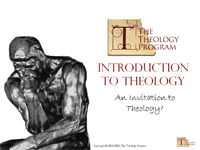
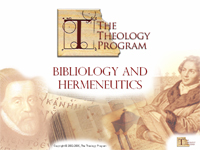
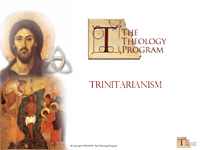
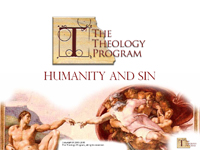


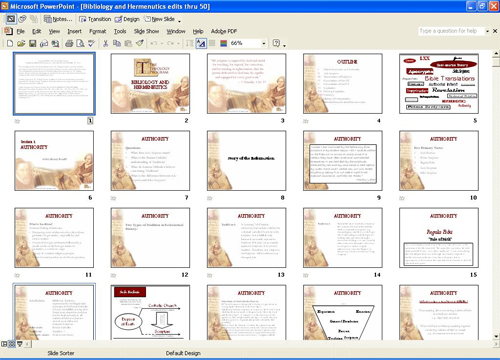 Each TTP PowerPoint presentation comes with hundreds of high quality slides with text, illustrations, graphs, and graphics to aid in the the student and the teacher, giving them a visual of the subject being taught.
Each TTP PowerPoint presentation comes with hundreds of high quality slides with text, illustrations, graphs, and graphics to aid in the the student and the teacher, giving them a visual of the subject being taught.
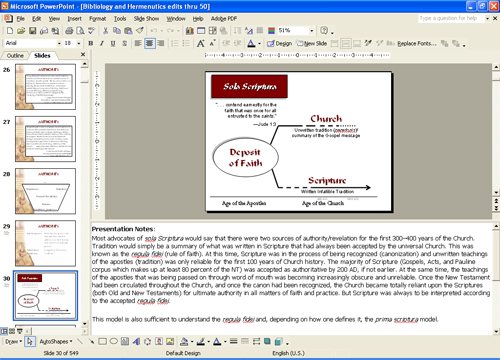 The leader's notes are viewable in edit mode of the presentation (the defalt mode that PowerPoint opens in). Most of the slides contain their own notes that pertain to the slide in view. Included in the leader's notes are lesson objectives for each session, presentation notes that give further information about the subject explaining the concepts of what is being taught, suggested illustrations to use for the subject, and references for further study.
The leader's notes are viewable in edit mode of the presentation (the defalt mode that PowerPoint opens in). Most of the slides contain their own notes that pertain to the slide in view. Included in the leader's notes are lesson objectives for each session, presentation notes that give further information about the subject explaining the concepts of what is being taught, suggested illustrations to use for the subject, and references for further study.
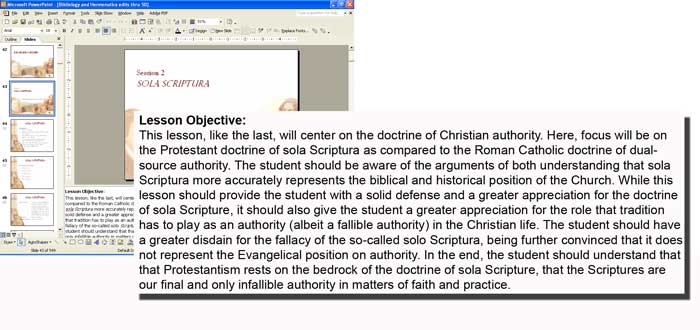
Click here to download the Introduction to Theology PowerPoint for free.




















